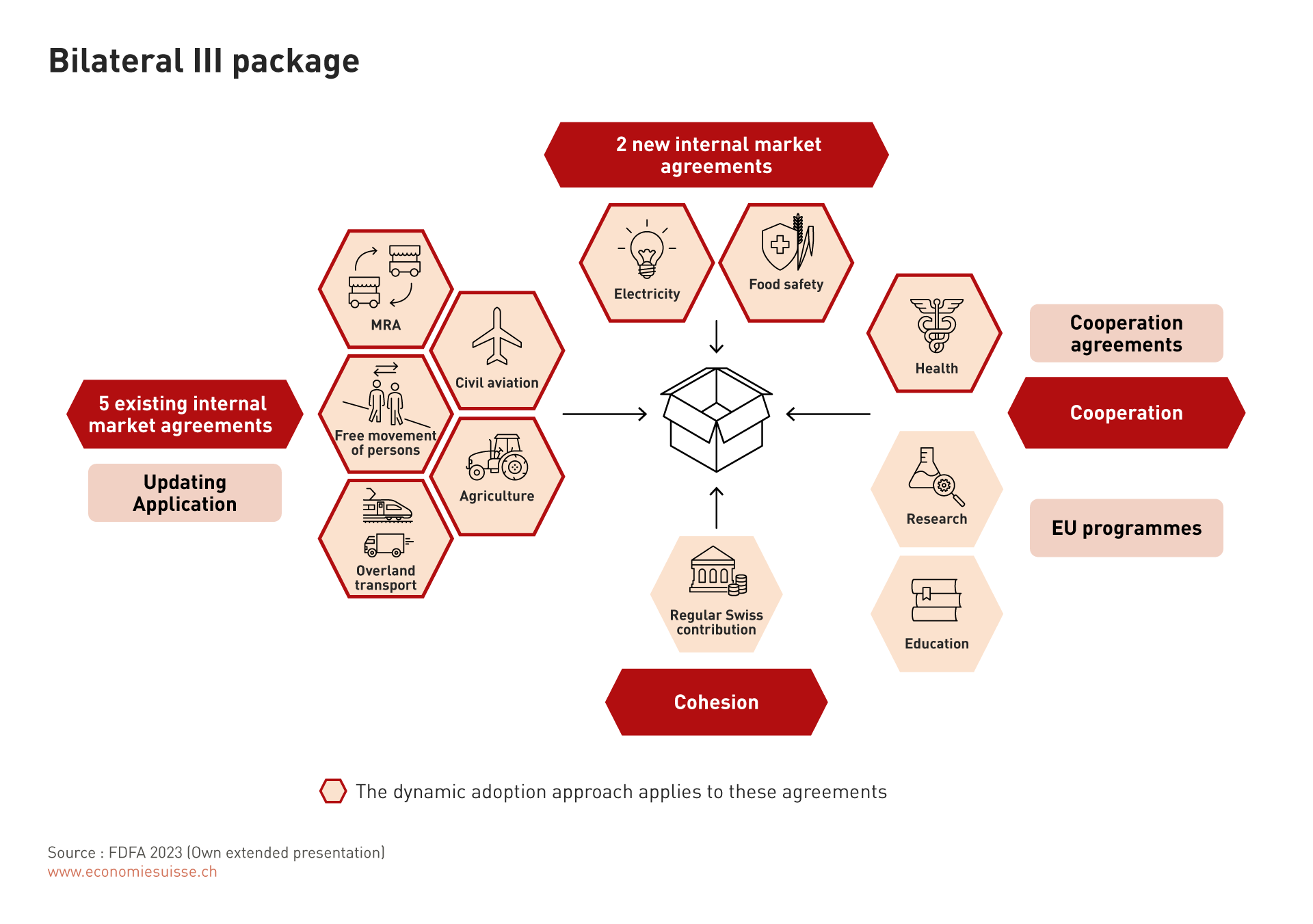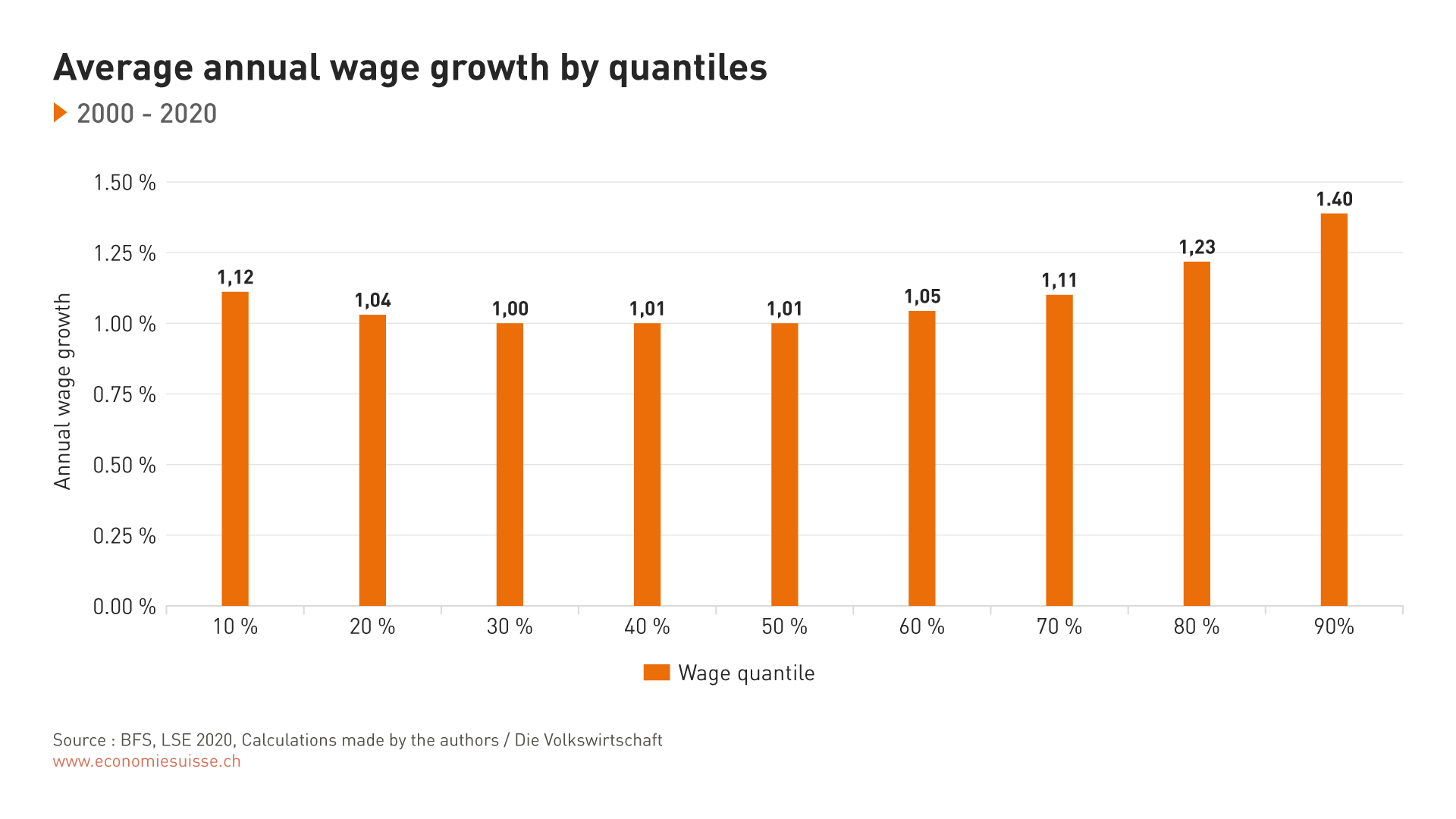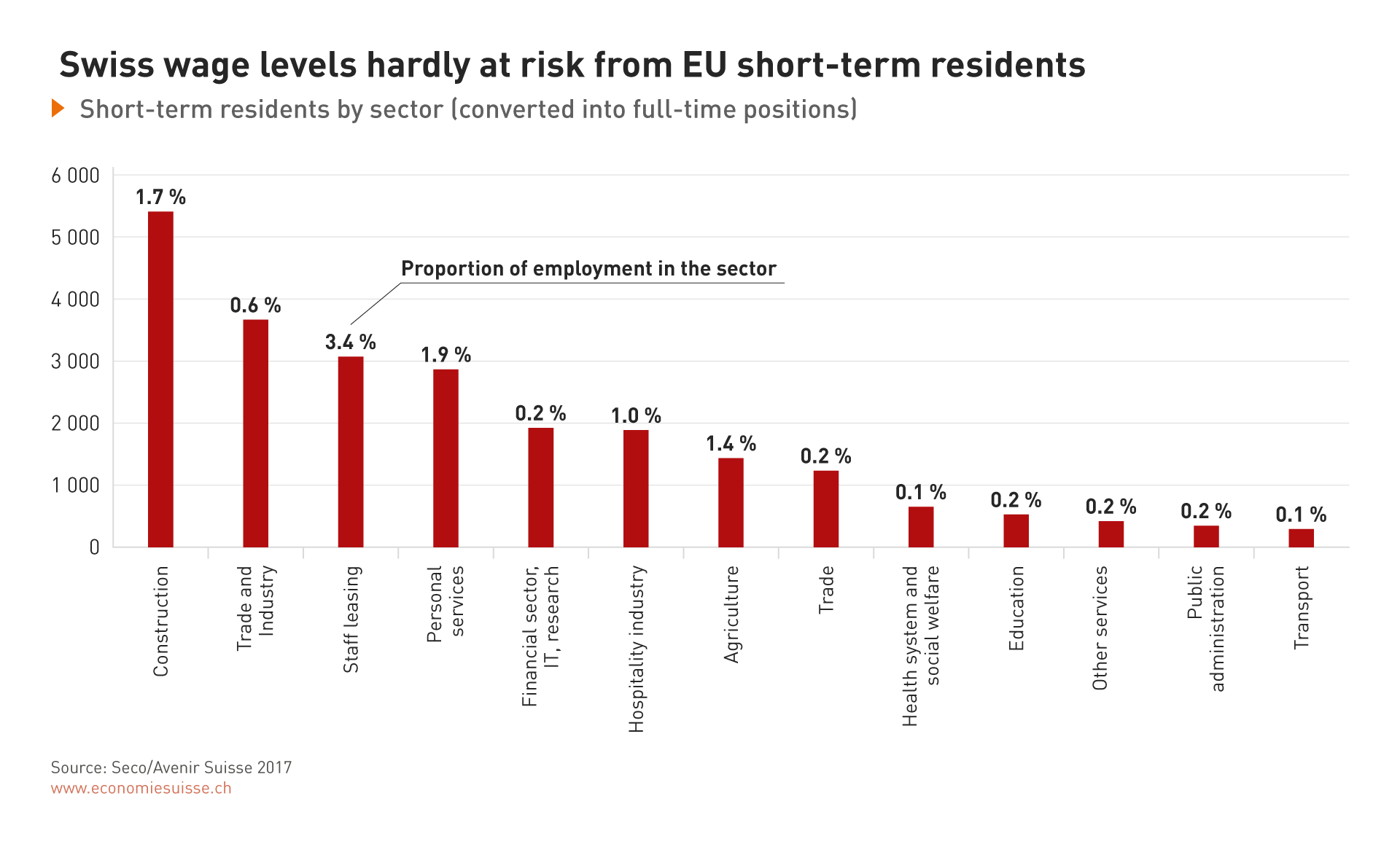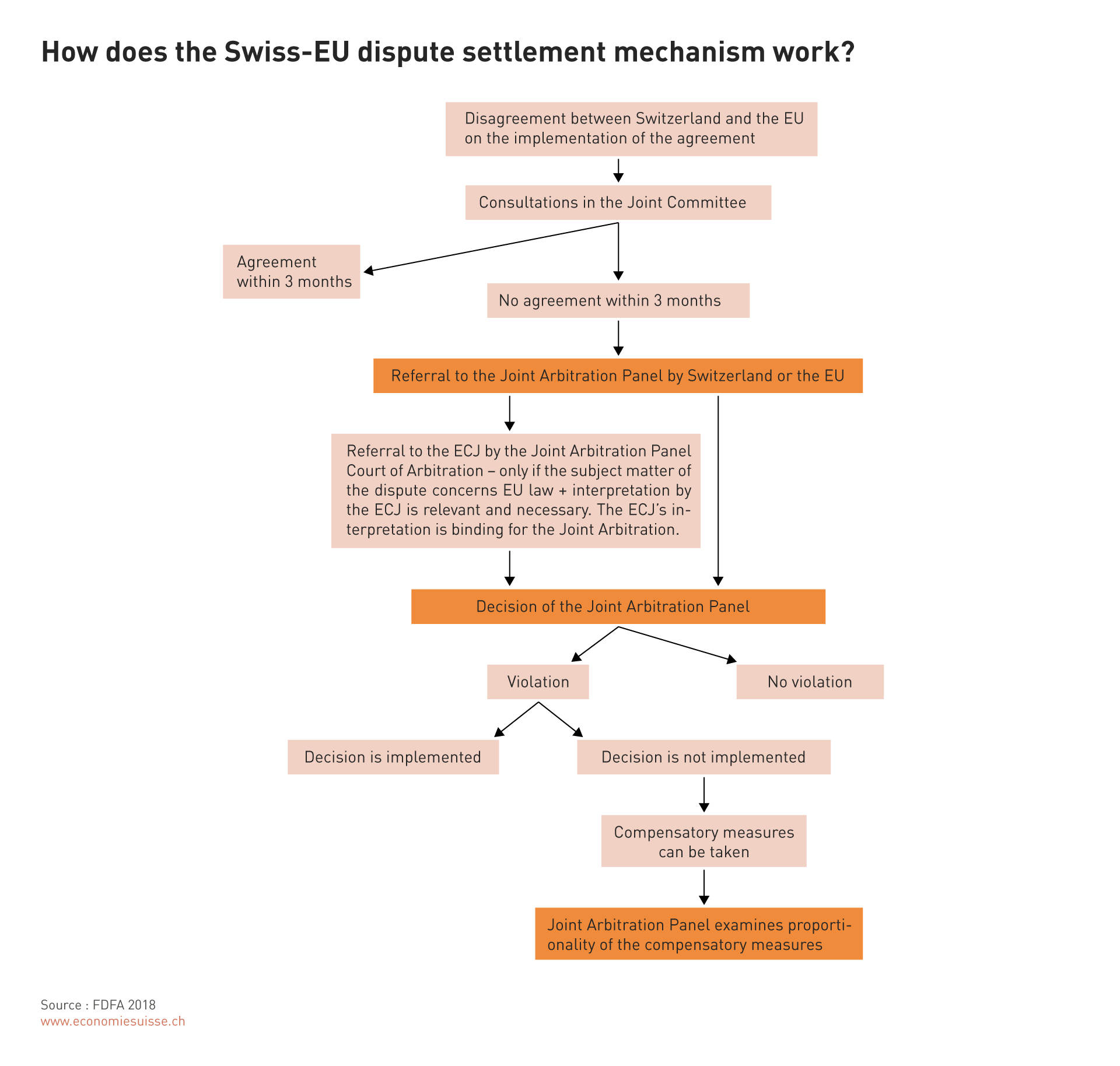Bilaterals III: What is it all about?
- Introduction Executive summary | Positions of economiesuisse
- Chapter 1 The course has been set for the start of the negotiations
- Chapter 2 Package Bilaterals III – Was is included and how is the content to be assessed?
- Chapter 3 Priorities for the upcoming negotiations
- Chapter 4 Switzerland must seize its opportunity and negotiate swiftly
Package Bilaterals III – Was is included and how is the content to be assessed?
Package approach Bilaterals III
- A whole package is to be negotiated that includes the new singlemarket agreements and cooperation in Switzerland’s interest. This includes t electricity, food safety, research, education and health. In addition, the regulatory dialogue with the EU in the financial sector is to be resumed.
- All elements of the Bilaterals III negotiation package are shown in the following diagram:

- According to the Federal Council, the institutional issues are now to be solved individually in each agreement (vertical, sector-based approach).
- In this way, the dynamic adoption of EU law, dispute settlement and exemption clauses can be resolved individually in the five existing, as well as thetwo new internal market agreements and the cooperation agreement on health
economiesuisse’s assessment
- economiesuisse welcomes that Switzerland and the EU wish to conclude new bilateral agreements in the areas of electricity and food safety, as well as the cooperation agreement in the areas of research & innovation and health.
- In addition, updating the existing single market agreements, and in particular the Agreement on dismantling technical barriers to trade (MRA), is economiesuisse’s top priority. Without updating this agreement, with in total 20 product categories, up to 60% of Swiss export companies would lose their current participation in the EU internal market from 2026/2027.
- The Swiss medtech industry has already lost barrier-free access to the EU single market in 2021. As a result, Swiss medtech companies must now export their products to the EU under the more difficult conditions for third-country companies.
- The opportunities for Swiss banks to provide services from Switzerland for their clients in the EU are becoming increasingly restricted.
- economiesuisse welcomes the resumption of the regulatory dialogue in the financial sector . Rapid recognition of the equivalence of Swiss stock exchange regulation by the EU should be sought.
Institutional rules will only apply to eight of 140 bilateral agreements in the future
The applicability of the institutional rules does not apply across the board, but is limited to Switzerland’s five existing and two new single market agreements with the EU. This creates domestic political clarity, reduces the potential for conflict and ensures legal certainty.
New single market agreement for electricity
- From 2025, Switzerland will face a significant electricity import risk, especially in winter. This problem arises in part due to the new rules in the EU, which stipulate that 70% of grid capacities must be reserved for electricity trading in the internal market from 2025 (see SFOE study) – only available in German).
- With an electricity agreement, Switzerland would be treated in the same way as EU member states in the future.
economiesuisse’ assessment
- economiesuisse welcomes the conclusion of an electricity agreement with the EU and sees this as an important element for improving grid stability, strengthening security of supply and creating new trade opportunities, e.g. in the area of hydropower.
- According to an ETH study commissioned by economiesuisse, Switzerland could save over CHF 50 billion by 2050 with an electricity agreement.
EU supports the Swiss proposal of a choice model for electricity
It is encouraging that the EU supports Switzerland’s proposal to introduce a choice model. This model would give consumers in Switzerland the choice of remaining in the so-called basic supply system (in which they purchase electricity from their local grid operators at predefined prices) or purchasing their electricity on the free market.
New single market agreement for food safety
- The single market agreement for food safety, focuses on access to EU early warning systems and risk assessments of the EU, the reduction of trade barriers, market liberalization and strengthening consumer protection.
- The Federal Council intends to protect the Swiss population even more effectively from potentially dangerous foods in the future.
- For those reasons, the Federal Council negotiates, among other things, the membership of the European Food Safety Authority (EFSA) and the
- Rapid Alert System for Food and Feed (RASFF).
- Switzerland's agricultural policy remains unaffected by the agreement.
- The aim of the negotiations will be to use exemptions to prevent a lowering of the standards applicable in Switzerland, particularly in the areas of animal welfare and food safety.
economiesuisse’s assessment
- Full membership of RASFF would bring many advantages for Switzerland.
- Access to all notifications would allow to take measures to protect consumers at an early state.
Cooperation in research: Switzerland’s participation in “Horizon Europe”
- The package approach aims at a rapid full association of Switzerland in the EU research programme “Horizon Europe”. With a budget of almost 100 billion euros, it is the largest research programme in the world.
- The various funding instruments cover everything from basic research to applied research and technological innovation.
- It is currently not possible to lead EU research projects from Switzerland. In addition, Swiss researchers can no longer apply for grants from the European Research Council. This means that an important and prestigious funding instrument is no longer available to them.
- As a basis for a full association to “Horizon Europe”, a specific agreement must be negotiated that sets out the framework conditions for Switzerland’s current and future participation in all EU programmes (thus research, innovation, general and professional education, youth, sport and culture). The EU has already negotiated such framework conditions with other third countries such as the Faroe Islands and New Zealand, as well as with the UK as part of its Brexit agreement.
- However, Switzerland will still decide for itself on a case-by-case basis whether it wishes to participate in a specific EU programme. The specific agreement, however, should significantly facilitate and accelerate future negotiations on Switzerland’s participation in EU programmes.
eonomiesuisse’s assessment
- Switzerland as a research centre is of the utmost importance for the innovative capacity of the Swiss economy and is suffering from the current decoupling from “Horizon Europe”.
- Rapid full association with “Horizon Europe” is a top priority for economiesuisse. Since September 2023, the UK has also been fully involved in the programme again.
Full association with «Horizon Europe» is still worthwhile
For the innovation-based Swiss economy, rapid full association is still worthwhile: As the foundations for the follow-up programme are being laid in the last third of “Horizon Europe”, Switzerland could already be involved in the preparatory work for the new programme.
Cooperation in education: of Switzerland’s participation in “Erasmus+”
- Switzerland’s participation in the EU education programme “Erasmus+” is planned as part of the package approach. “Erasmus+” is the EU programme for the promotion of education, training, youth and sport in Europe. It has a budget of around 26.2 billion euros.
- The 2021-2027 programme focuses on social inclusion, the green and digital transitions and promoting young people’s participation in democratic life.
economiesuisse’s assessment
- Switzerland relies on an excellent education system in order to conduct high-quality research and promote innovation. Promoting international mobility is an important element of this.
- Switzerland’s full association with “Eramus+” should be pursued if it is financially viable and the cost-benefit ratio is favourable.
Health cooperation agreement
The package approach envisages a cooperation agreement between Switzerland and the EU in the health sector, containing following elements:
- Cooperation with the European Centre for Disease Prevention and Control (ECDC)
- Participation to the Early Warning and Response System (EWRS)
- Switzerland’s inclusion in the new EU-wide mechanism for dealing with cross-border health threats
- Participation in the multi-annual EU health programme
- The cooperation can later be extended to other areas of health if both parties decide to do so ("evolutive clause")
Cross-border patient mobility, tobacco and pharmaceuticals are excluded.
economiesuisse’s assessment
- economiesuisse welcomes the conclusion of a cooperation agreement in the health sector.
- Switzerland has an interest in participating in the EU risk assessment and rapid alert systems for health protection due to the short response times and high potential for damage in crisis situations.
Accompanying measures and wage protection
According to the Federal Council, most of the issues relating to wage protection for posted workers have been satisfactorily resolved. For example, the EU has accepted the following exceptions to the law on the posting of workers:
- A non-regression-clause (should the EU reduce the wage protection in the law on the posting of workers, Switzerland would not have to adopt these rules),
- an advance notification period of four working days based on an objective and industry-specific risk-analysis,
- the obligation to provide a deposit for companies which have not met their financial obligations in the past and
- Measures to combat false self-employment.
economiesuisse’s assessment
- economiesuisse supports maintaining the current wage protection level. The economy is fully behind the fight against wage dumping.
- However, the expansion of wage protection, the introduction of minimum wages or other inappropriate concerns are clearly rejected.
- The non-regression-clause fulfils one of the trade unions’ main demands. Additionally, the dual enforcement system (monitoring and sanctioning competence) by the Swiss social partners will not be restricted by the EU and the above-mentioned EU-related adjustments to the existing accompanying measures are offset by domestic measures in order to maintain the level of wage protection.
- According to the “Common Understanding”, the principle of “equal pay for equal work in the same place” also includes expenses. The expenses regulation in the EU must therefore not lead to unfair competition in Switzerland. At the same time, wage protection measures must be proportionate.
- The domestic discussions between the social partners, the business community, the federal government and the cantons will continue and solutions will be finalised.
Wage protection in Switzerland is not jeopardised
The other existing measures would not be contractually secured and would be subject to legal developments or dispute resolution. In terms of content, however, they are equivalent to the measures in the EU and are therefore not jeopardised. In addition, Switzerland can also take accompanying measures in the future to ensure the principle of "equal pay for equal work in the same place", provided they are compatible with the Posting of Workers Directive and the Enforcement Directive, i.e. are non-discriminatory and proportionate. At the same time, the non-regression-clause additionally safeguards the level of protection level in the event of future legal developments. The EU does not call into question the objectives of the Posting of Workers Directive, i.e. protection against wage dumping and the maintenance of Swiss wage levels.
Free Movement of Persons did not lead to a lower wage level in Switzerland
The trade unions are fighting the adjustment of the accompanying measures on the grounds that it would lead to a widespread collapse in the level of wage protection in Switzerland. However, all empirical studies and the SECO observatory reports have so far confirmed that the introduction of the free movement of persons has neither led to systematic displacement effects nor to a lower wage level. On the contrary, it has been established that the lowest wages in Switzerland have also risen since the AFMP came into force.

Short-term residents account for only 0.7 per cent of total employment
The economic significance of the accompanying measures must be correctly categorised. According to calculations made by Avenir Suisse in 2017, short-term residents in Switzerland perform a volume of work that corresponds to just 0.7 per cent of total employment. Therefore, the adoption of EU law on posted workers is not expected to have a systematically negative impact on wage levels in Switzerland.on wage levels in Switzerland.

Dynamic adoption of EU law
Switzerland will be able to decide autonomously on each individual adoption of single market law within the single market agreements.
Switzerland has two years for the dynamic adoption of legislation. Switzerland's direct democratic decision-making processes will be safeguarded. In the event of a legislative referendum, Switzerland is guaranteed an additional year for implementation.
It is foreseen that Switzerland will be systemically consulted on the development of relevant EU legislation, in the same ways as the other member states, and will be able to actively contribute its concerns as part of the decision shaping framework.
economiesuisse’s assessment
- The dynamic adoption of EU law, together with the introduction of a dispute resolution mechanism, creates reliable framework conditions and legal certainty for Swiss companies, which economiesuisse welcomes.
- Today, for example, the EU Commission is blocking the updating of the agreement on dismantling technical barriers to trade (MRA) without Switzerland being able to defend itself against this in front of a joint arbitration panel (see next subchapter).
- Thanks to clear rules on countermeasures in the event of non-adoption of internal market law by Switzerland, this would no longer be possible in future. Switzerland could take such a case to the joint arbitration panel.
The dynamic adoption of EU law is not a threat for the direct democracy
The obligation to dynamically adopt EU legislation is already enshrined in the Air Transport Agreement (Bilateral Agreements I) and the Schengen/Dublin Agreement (Bilateral Agreements II) and has not led to any problems since they came into force in 2002 and 2008 respectively. In May 2019, for example, Swiss voters were able to express their opinion on the implementation of the EU Weapons Directive in Swiss weapons legislation in a referendum. The "Interessengemeinschaft Schiessen Schweiz" (Swiss Shooting Interest Group) had launched a referendum against the implementation.
Dynamic adoption of EU law only with clear reference to internal market agreements
EU directives and regulations may also contain rules that are not relevant to the single market and the related single market agreements. It will be important for Switzerland to exclude their application when adopting them. If, for example, an agreement is to be extended to a new subject area that has no connection to the original core of the agreement, this extension should not be covered by the dynamic adoption of EU law but would require a new agreement on this subject area.
Dispute resolution
The package approach envisages a dispute settlement mechanism to be used in the event of disagreements between Switzerland and the EU when implementing a single market agreement. This mechanism is described in detail in the following diagram:

- The arbitration tribunal responsible for settling the dispute will be composed of equal numbers of judges, e.g. three judges appointed by Switzerland and three by the EU, as well as an independent presidium.
- This is in line with established principles of international law: Switzerland has concluded such parity arbitration proceedings in many of its agreements.
economiesuisse’s assessment
-
Switzerland’s position is improved by the dispute settlement mechanism. It has an instrument to effectively assert its interests in relation to the single market agreements concerned through legal channels.
-
Compensatory measures can go as far as to the suspension of agreements. Termination is excluded. However, a suspension of entire agreements by the EU is unlikely to be proportionate if Switzerland does not wish to adopt individual legal developments.
There are no “foreign judges”
The bilateral agreements do not foresee any "foreign judges" either now or in the future. There are three types of legal cases:
- If a legal dispute arises in Switzerland, a Swiss court has jurisdiction.
- If a legal dispute arises in an EU country, such as Germany, a German court and, if necessary, the European Court of Justice (ECJ) has jurisdiction.
- If there are differences of opinion between the EU Commission and the Federal Council regarding the interpretation of rules, for example in land transport or the free movement of persons, then a joint arbitration panel comes into play.
In the future, the equal arbitration tribunal will decide which law applies - Swiss law, contract law or EU internal market law. If Switzerland has contractually adopted EU internal market law, e.g. in the medtech sector, the ECJ will decide on the question of the interpretation of European internal market law alone. If Switzerland and the EU have agreed on special rules, such as special rules and exemptions for the heavy vehicle charge or the accompanying measures for the free movement of persons, this law applies. At the end of the proceedings, the joint arbitration panel will judge whether Bern or Brussels has violated the law.
An analysis of all previous ECJ rulings that required an interpretation of EU internal market law shows that the ECJ acts objectively and impartially and "does not systematically rule to the detriment of Switzerland or complainants and companies that invoke the (market access) rights secured by the agreement". The number of future dispute settlement proceedings is difficult to estimate. A look at the "conflicts" in recent years shows that a small number can be expected.
State aid and competition rules
- The package approach contains the inclusion of rules on state aid in the existing single market agreements on air and land transport and in the new electricity agreement.
- The aim is to create a level playing field for Swiss and EU players in the internal market and avoid distortions of competition through state intervention.
- All other agreements, the promotion of economically disadvantaged regions or the realisation of important projects in the interest of the country are not affected by the ban on state aid.
economiesuisse’s assessment
- economiesuisse welcomes that the EU state aid law will only apply to the air and land transport, as well as electricity agreement. It is also important that Switzerland will monitor state aid itself (Two-pillar model)
- From a business perspective, increased transparency of subsidies and grants in Switzerland is generally desirable.
The independence of state aid monitoring remains guaranteed
Compliance with the state aid rules is to be ensured by a separate, independent monitoring body with an equivalent approach. For the EU, this is the EU Commission. Switzerland would have its own system and would still have to create such a body or assign this task to an existing body (e.g. the Competition Commission COMCO). This body can decide on the reimbursement of unlawful state financial aid to companies or grant authorisation for planned aid.
Land transport: no liberalisation of national transport planned
In the context of the land transport agreement, the EU is only asking Switzerland to open up international rail passenger transport (IPT). Swiss rail travellers can therefore expect an expansion of the range of international train connections. However, new providers would have to take into account the regular timetable, respect tariff integration and comply with Swiss working conditions. The public service in Switzerland is not affected: Impacts on the railway infrastructure are excluded and are not part of the agreement. Liberalisation of national transport is therefore out of the question.
Citizen’s Rights Directive (CRD)
- Since 2004, the CRD has regulated the free movement and residence of EU nationals. As a legal act, the CRD summarises most of the regulations in force to date in the area of the free movement of persons.
- For the negotiations, the Federal Council aims to minimise the risks for the social welfare system by adopting the CPR. Freedom of movement is also focussed on employees.
- Additionally, according to the draft mandate and the results of the exploratory talks, a conflict with the valid Federal Constitution on the issue of expulsion from the country is ruled out.
economiesuisse’s assessment
- In economiesuisse’s view, an extension of the applicability of the CRD beyond the free movement of persons is inadmissible.
- For the negotiations, it is essential that the regulations relevant to the single market that must be adopted by Switzerland are clearly distinguished from those that do not have to be adopted.
There is no threat of immigration into the Swiss social security system
The legal situation in the EU and Switzerland is already comparable in terms of EU citizens' right of residence and entitlement to social benefits for up to five years: Both are linked to an existing employment contract. In addition, the ECJ grants EU member states a wide margin of manoeuvre when it comes to the entitlement to social benefits of non-working EU citizens from another EU country. Non-working EU citizens who move to another member state for the sole purpose of receiving social benefits can be excluded from certain social benefits, the ECJ ruled in November 2014.
Criminal EU nationals can still be expelled in future
The partial adoption of the CRD will not make it more difficult to expel criminal EU citizens from Switzerland. The decisions of the Federal Supreme Court on the expulsion of EU citizens show that Swiss practice is within the scope of the discretion granted to EU member states: in 2019, for example, the expulsion of a Spanish national sentenced to 19 months' imprisonment for drug trafficking was confirmed because his behaviour had endangered public order and the health of many people.
Nationals of our neighbouring countries already have permanent residence rights
Nationals of 15 EU and EFTA states are already entitled to a permanent residence permit after five years in Switzerland under the Foreign Nationals and Integration Act (FNIA) and bilateral agreements. With the adoption of parts of the CRD, this entitlement would be extended to all other EU member states. However, the consequences of this extension are likely to be limited, as nationals of the neighbouring countries with the largest immigration quotas (Germany, France, Italy and Austria) are already entitled to permanent residence after five years.
Stabilisation of the Swiss cohesion contribution
- The package approach foresees a regular contribution of Switzerland to the cohesion within the EU. This involves autonomous financial aid provided by Switzerland to certain EU member states.
- Switzerland has been participating in selected projects to reduce economic and social disparities in the EU since 2007. In doing so, it contributes to the promotion of cohesion and stability in Europe.
economiesuisse’s assessment
- The stabilisation of the contribution is to be welcomed if the outcome of the negotiations is satisfactory from a macroeconomic perspective.
- It is also in Switzerland's interest to reduce the economic differences in the European internal market so that the participating countries become attractive target markets with greater purchasing power.
- It is in Switzerland's political and economic interests to expand relations with the recipient states in Central and Eastern Europe.





